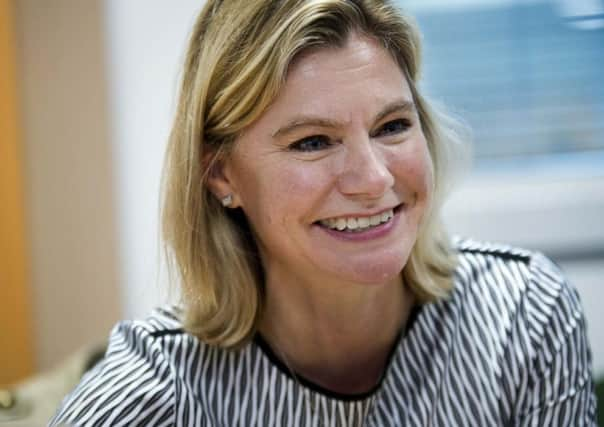Justine Greening: How working in Morrisons taught lessons about work that set me up for life


No, I spent my Saturdays creating far more havoc serving in the Morrisons restaurant. I dealt with unfortunate shoppers who came in on a Saturday and then made the mistake of deciding to have a cup of tea.
There was often more tea in the saucer than the cup by the time I’d brought it over to them. I’m not sure I’d have made their Employee of the Month.
Advertisement
Hide AdAdvertisement
Hide AdI wasn’t at all keen on that job, which was compounded by also having to wear a straw hat as part of the uniform, but that job did teach me a lot: timekeeping, dealing with the public – I wasn’t sure I’d need that for the future though I quite liked it – teamwork. I had the satisfaction of getting a pay cheque at the end of the month.


All of us in the team had our plans for the future. I wanted to go to university and then maybe work in business. I’d have laughed at the suggestion I might become an MP. I remember another girl, Karen, wanted to be a vet.
At the time, that Saturday job was mainly about having a bit of extra cash as a young adult. I don’t think any of us necessarily thought about how many workplace skills we were picking up or how valuable they were. Today’s young people are very different – they know how vital work experience is to their CV. It’s why getting more access to work experience matters to them so much. One thing that hasn’t changed though is they know, as our Morrisons restaurant team did, that A-Level grades matter.
I launched the Social Mobility Pledge to get companies to commit to simple steps giving more opportunity to more young people. It includes a commitment to have more open recruitment including contextual recruitment. That means an employer looks at a candidate’s A-Level grades in the context of their schools and background.
Advertisement
Hide AdAdvertisement
Hide AdEmployers like it because they have a better chance at still finding the hidden talent they’ll otherwise miss – young people with slightly lower grades but who have had a more difficult start and education. And in demonstrating the capacity to overcome challenges, these young people often are the candidates with exactly the sort of attitude and skills of tenacity and resilience that employers also really value.
Contextual recruitment has been successfully used by most major law firms since 2015. My support for it generated accusations I wanted to discriminate against Old Etonians – not surprisingly from Old Etonians. But this misunderstands what contextual recruitment is all about. It takes away discrimination, rather than adds to it. Contextual recruitment is simply about having a more informed assessment of any candidate’s achievements, irrespective of which school they went to, Eton or otherwise.
Some universities like Bristol have also started using it because they also want to find the high potential students who don’t get flagged up by purely looking at grades.
The Government’s education reforms are raising standards in many schools, including in Yorkshire. There are now three Opportunity Areas in place to improve education in Bradford, Doncaster and North Yorkshire, working with schools, communities and businesses together.
Advertisement
Hide AdAdvertisement
Hide AdThey aim to have business set aspirations high and them complement that with the best teaching. But until that work is successfully completed, the children still going to worse- performing schools today shouldn’t have a life sentence of less opportunity because of that start. The chance to use their talents is just as precious to them and their parents as it is for the rest of us. Those kids have a right to compete for opportunities too.
And does having more young people pitching to get opportunities mean that there are fewer opportunities to go around? No, because social mobility isn’t a zero sum game. It’s lazy thinking to assume that kids from working class backgrounds can only take an opportunity someone else might have had and never create more for everyone themselves. You only have to look at the Sunday Times Rich List and how many self-made millionaires it includes to see that’s not true.
Driving social mobility is for the greater good. We’ll all benefit. More young people doing better means more entrepreneurs, more engineers, more doctors, more scientists – people and skills we need. And why shouldn’t they come from Yorkshire?
I hope that Karen made it to be a vet. After we both went to university, we lost touch. She was brilliant with people, great in the team and I’d have had her take care of my cat Charlie any day. All of that broader skillset would have more than outweighed any A instead of an A* grade she might have had in Chemistry. The sooner all businesses use contextual recruitment to level the playing field on opportunity, the better. Stronger opportunities for young people who deserve them and a stronger economy demand it.
Justine Greening is the former Education Secretary. Born in Rotherham, she writes a weekly column for The Yorkshire Post.